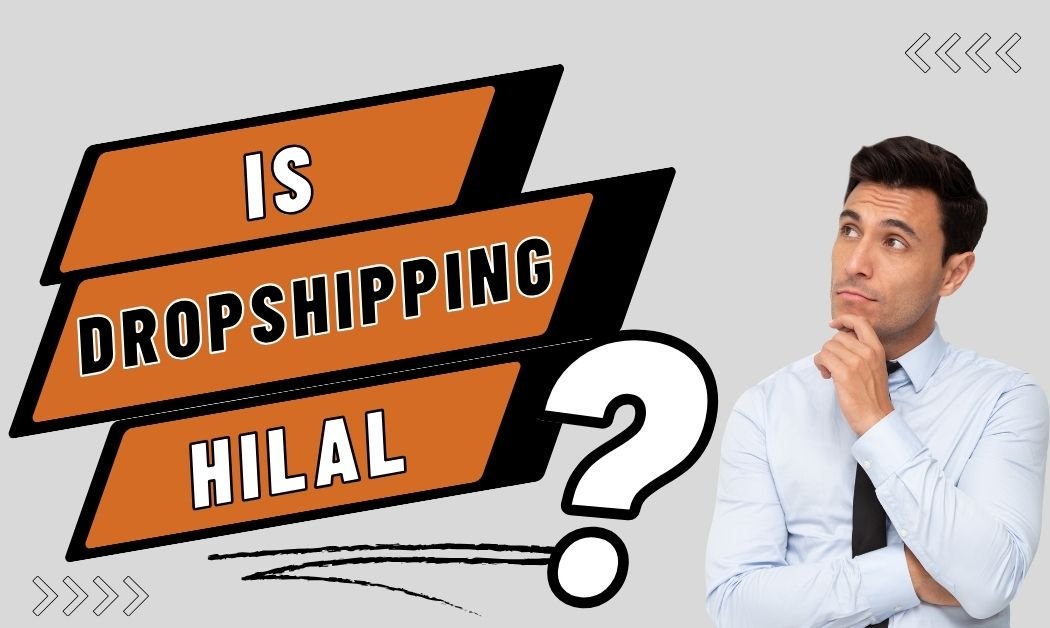Dropshipping is considered one of the best ways to make money online and this is because there are many people in the world who have made a lot of money through dropshipping. It is a popular business model for businessmen, and entrepreneurs because it is easy to start and does not require much investment for inventory, space, etc.
On the other hand, there is a debate among people about whether dropshipping is halal or haram, due to which newcomers, especially Muslims, are confused and ask is dropshipping halal. In this article, I will provide information based on Islamic rulings about dropshipping. Read this article completely to get the answer to the question “Is Dropshipping Halal”.
Remember, I am not giving a fatwa or asking you to believe it. This is my personal opinion based on information I have gathered from research on this. Read it completely, analyze and share your thoughts on it.
Before I get into that, I want to give a brief introduction to what dropshipping is.
What is Dropshipping?
Dropshipping is all about selling goods online without owning or storing any inventory. When a drop shipper receives an order from a customer, it places the order with a third party and asks him to deliver the product directly to the customer. A third party may be a supplier/manufacturer.
Simply put, if you want to become a drop shipper, you first need to create a website where you can place the products of the supplier/manufacturer. You will change the prices of these products by adding your profit to them. Then when a customer places an order on your website, you will send the order and customer details to your supplier/manufacturer and ask them to deliver the product to the customer.
Now let’s move to the main topic which is “ Is dropshipping halal “.
Is Dropshipping Halal?
There is no hadith available that directly states whether dropshipping is halal or haram because there was no concept of dropshipping at that time. In my personal opinion, nothing is haram unless it contains haram elements. So why do Muslim scholars consider dropshipping haram and what haram element is included in dropshipping?
First of all, not all Muslim scholars consider dropshipping to be haram, a debate among them. The main objection of the scholars who consider dropshipping to be haram is that “don’t sell what you don’t have” and they cite as proof a few authentic hadiths in which the Messenger of Allah, peace be upon him) forbade doing this. Following are the hadiths presented by him.
Hakim bin Hizam (RA) came to the Prophet (PBUH) and said: O Messenger of Allah (PBUH), a man asks me for something that I do not have. Can I sell it and then go and buy it from the market? He (peace and blessings of Allah be upon him) said: “Do not sell what you do not have.”
Nasa’i (4613), Abu Dawud (3503) and Tirmidhi (1232).
Amr bin Shuaib narrated from his father that his grandfather said: The Messenger of Allah, may God bless him and grant him peace, said: “It is not permissible to arrange a loan combined with a sale, or to stipulate two conditions in one transaction, or to make a profit on something that is not under your control, or to sell something that you do not possess.”
Tirmidhi (1234), Abu Dawud (3504) and an-Nasai (4611).
These are hadiths presented by Muslim scholars that prohibit dropshipping. There are also some hadiths in Sahi Muslim that I found from searching on the same topic that have the same context. You can read one of these hadith below.
Muammar narrated from Ibn Taus, he narrated from his father and he narrated from Ibn Abbas, he said: The Messenger of Allah, may God bless him and grant him peace, said: “ Whoever buys grain should not sell until he takes possession of it.”
Sahi Muslin (3838).
These are the hadiths that stated you can’t sell something that you do not possess. If you take these hadiths literally, dropshipping is forbidden in Islam, but if you pay attention to the purpose and theme of these hadiths and other hadiths on this matter, you will realize why the Messenger of Allah, may God bless him and grant him peace, forbade this.
In my personal view, these hadiths teach you to take possession of the goods you have bought so that their condition and quality become clear to you whether the goods you bought are in good condition or not. Because you cannot be satisfied with something without taking possession of it, that is why the words of possession are used in the hadith.
Suppose, if you buy an item and sell it before taking possession or do not check its quality and condition, and the condition of the product is not correct. When the buyer receives the item he bought, he does not find it in the desired condition, in which case the buyer has been cheated, which is prohibited by Islam. That is why these hadiths emphasize that you should take possession and then sell the product.
There is a chapter in Sahi Muslim called “Resale of purchased goods before taking possession is void “. The Hadith Number 3838 mentioned above is also `from the same chapter. If you read this chapter entirely, the intention and purpose of these hadiths will become clear to you. Following are the three hadiths that will provide clarity on the entire topic.
Hammad narrated to us a hadith from Amr bin Dinar, he from Taaws, and he narrated from Ibn Abbas, may Allah be pleased with him, that the Messenger of Allah, may God bless him and grant him peace, said: Whoever has bought grain should not sell it before fulfilling the purchase.”
Sahi Muslim (3836).

It was narrated from Ibn Abbas, may Allah be pleased with him, that the Messenger of Allah, may God bless him and grant him peace, said: If someone buys grain, do not sell it until measures it (takes possession of it).
Sahi Muslim (3839).

It was narrated from Ibn Umar, may Allah be pleased with him, that the Messenger of Allah, may God bless him and grant him peace, said: Whoever buys grain, should not sell it before he gets the full amount.”.
Sahi Muslim (3840).

The above-mentioned three hadiths have the same context but different wording which is “Whoever buys grain should not resell it before fulfilling the purchase, measures it and get the full amount/quantity. Simply put, if you buy something with the intention of reselling, check it first and sell it after you are satisfied. The motive behind this was to keep the transactions dignified and free from fraud, that is why the Messenger of Allah (peace and blessings of Allah be upon him) gave these instructions to the people.
These are the guidelines I derived from these hadiths, now let’s talk about what happens in dropshipping when a drop shipper receives an order and all the steps through which the product is delivered to the customer.
As I mentioned above, when a drop shipper receives an order, he sends the order and customer details to the supplier. The supplier ships the product to the customer in exchange for which the supplier receives the price of the product and the drop shipper receives the profit from selling the product.
All good suppliers/companies provide a return policy to the customer which means that if the customer does not like the product, he can return the product within a certain number of days. In most cases, the drop shipper receives his profit after the customer has passed the return period.
This is how dropshipping works and in my opinion, there are no haram or harmful elements involved in the dropshipping process. It is everyone’s responsibility to make sure that what you are going to do is right whether it is dropshipping or something else. The customer should confirm whether the site where he is going to order is reliable or not and the drop shipper should check the quality and condition of the product before promoting.
How can a drop shipper check the product?
At this point, a question that may come to your mind is that the drop shipper never has the product and they also don’t know about the condition or quality of the product, how will the drop shipper check the product?
The answer is a drop shipper can’t check the product, it is difficult for him to check every single product that he is going to promote because the supplier or product manufacturer may be far away from him. But, there are certain boxes that every drop shipper should tick before promoting a product and it is mandatory. Following are the things that every drop shipper should follow.
- Find a good Supplier: As I mentioned above, the drop shipper cannot check the quality of the product, so it is important to find a supplier that has a good reputation and provides quality products. Read their reviews and ask others for recommendations.
- Order a Sample: Ordering a sample is a great way to test the quality of a product before making a promotion. Through this, you will get to know the supplier and ensure that the product meets their standards.
- Shipping Carrier: Product shipping is an important part of dropshipping. Every drop shipper should choose a reliable shipping carrier that offers a guarantee against lost or damaged packages.
- Return Policy: Every drop shipper should clearly mention their return policy as it protects the right of customers to return the product if it does not suit their needs. It also helps the drop shipper generate more sales by giving the customer a return option.
- Use a dropshipping tool: Use a dropshipping tool to automate your business. It can automatically place orders with suppliers, track delivery records, etc.
Conclusion:
In today’s era, with significant advancements in information technology, mobile devices, and the wide availability of the internet, online shopping has become a trend that creates multiple opportunities for the youth to earn money. Not only this, the way of working and transaction is also changed and advanced so let me know in the comment section how you see all the changes from a religious perspective.
I hope you found this article useful and don’t forget to share it with your friends and family so that they too can be aware of such issues. Also, share your personal thoughts and suggestions on it.
You May Like








